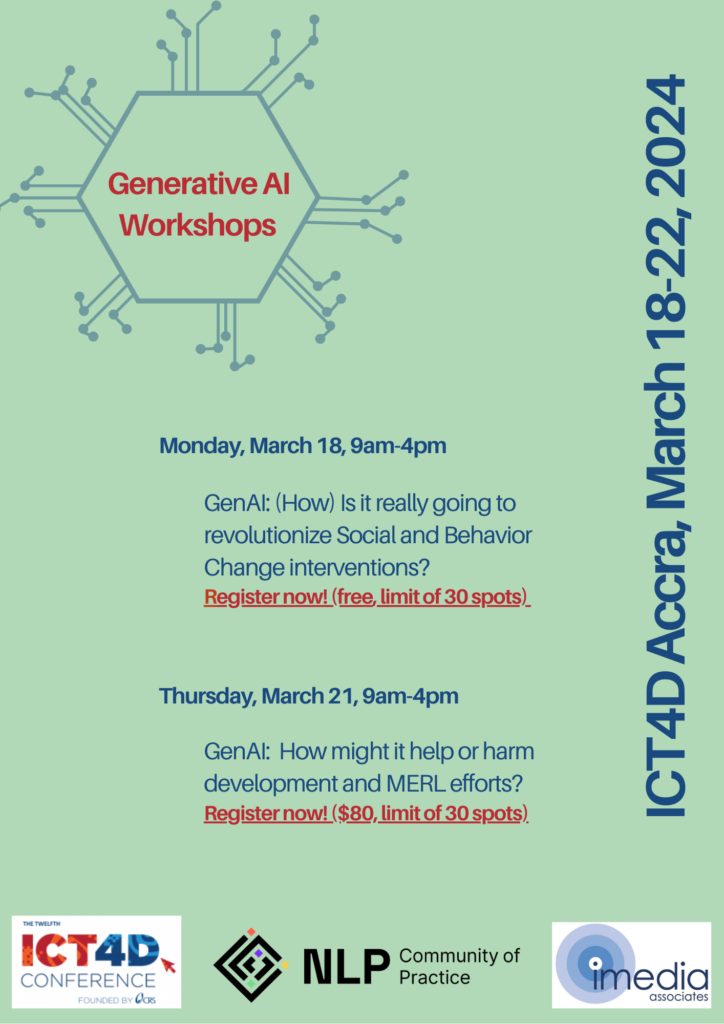Join the NLP-CoP this week at ICT4D in Accra and AfrEA in Kigali
This week, join or follow along from afar as members of the NLP-CoP participate in ICT4D conference in Accra and the African Evaluation Association (AfrEA) conference in Kigali. In Accra, NLP-COP members will be leading two workshops and a ‘big discussion’ on Generative AI. In Kigali, NLP-CoP members will be facilitating two roundtable discussions on evaluating digital audience segmentation for social behavior change and ‘Made in Africa’ Generative AI-enabled MERL practice.

GenAI and Social and Behavior Change: Monday, March 18, from 9am-4pm Accra Time
iMedia Associates will host a free, in-person, hands-on learning workshop led by expert digital design and development practitioners Linda Raftree and Isabelle Amazon-Brown. The workshop will bring together researchers and implementers in the Social and Behavior Change Communication (SBC/C) sector who are interested in, or actively using, Generative AI (GenAI) powered tools to deliver or evaluate their work.
GenAI for MERL and Development: Thursday, March 21, from 9am-4pm Accra Time
MERL Tech and Oxford Policy Management Lab (OPML) are organizing a day-long workshop led by Paul Jasper and Linda Raftree. The workshop will include how to use Gen AI in their work; how it will impact development programming and MERL; the biases, risks and ethical dilemmas to look out for; and possible ways to mitigate risks.
As part of the main conference agenda, the NLP-CoP is organizing a plenary session that brings together experts in the field to discuss how AI is changing the policy evidence and impact measurement landscape globally and the ways in which we produce and analyze data for the purposes of monitoring and evaluating policies and programs across the world. The focus will be on how AI can help to produce better evidence faster while avoiding biases and other challenges inherent in data and algorithms used for these purposes.
Use the special MERL Tech Member Discount Code (the code is: MTech) to receive 20% off registration.
In Kigali, NLP CoP members are excited to join the conversation about this year’s AfrEA (somewhat leading) conference theme: Technology and Innovation in Evaluation Practice in Africa: The Last Nail on the Coffin of Participatory Approaches. What’s amazing to note is that amidst the vast array of sessions this year, at least 40 are under the AI strand or have some aspect of AI in their title. Unless we are mistaken, this is the highest number of sessions on AI at an evaluation conference ever—suggesting African evaluators are leading the conversation on AI-enabled evaluation, at least within VOPE conference fora. Aside from the many sessions in the Artificial Intelligence and Evaluation: are we experiencing a revolution on how we evaluate? strand, we are excited for sessions in the Decolonizing evaluation in Africa in the Post Crisis Era and the Indigenous Evaluation and Ethics: Recalibrating the Made in Africa Evaluation in the Context of the Decolonization Debate strands.
MERL Tech and iMedia Associates are teaming up for two sessions facilitated by Zach Tilton, Nicola Harford, and Bryson Mwakuwona. The first session, Segment, Engage, Evaluate: measuring the behavioural impact of digital audience segmentation and targeted content shares insights from an ongoing evaluation investigating the extent to which combining NLP, LLM tools, and digital segmentation can make a difference in social behavior change outcomes for sexual and reproductive health. Ultimately, the session will explore how innovation and experimentation can contribute to the broader health communication sector, providing evidence-based strategies for optimizing the impact of interventions through targeted digital engagement.
The second roundtable discussion is titled, Made In Africa AI-enabled Evaluation Practice: Lessons from the MERL Tech NLP, plans to share insights from the last year of NLP CoP organizing as they pertain to supporting Gen-AI-enabled evaluation capacity building in African contexts. Facilitated discussions will revolve around pivotal questions like the optimal use of LLMs in evaluation, the main challenges posed by these models, and strategies to ethically integrate AI into evaluation practices, including what needs to be considered for a Made in Africa approach to AI-integrated evaluation.
If you are attending ICT4D or AfrEA this week, let us know as we’d love to connect!
You might also like
-
What’s happening with GenAI Ethics and Governance?
-
Join the AI and African Evaluation Working Group Meet ‘n’ Mix Session on May 7!
-
Hands on with GenAI: predictions and observations from The MERL Tech Initiative and Oxford Policy Management’s ICT4D Training Day
-
When Might We Use AI for Evaluation Purposes? A discussion with New Directions for Evaluation (NDE) authors